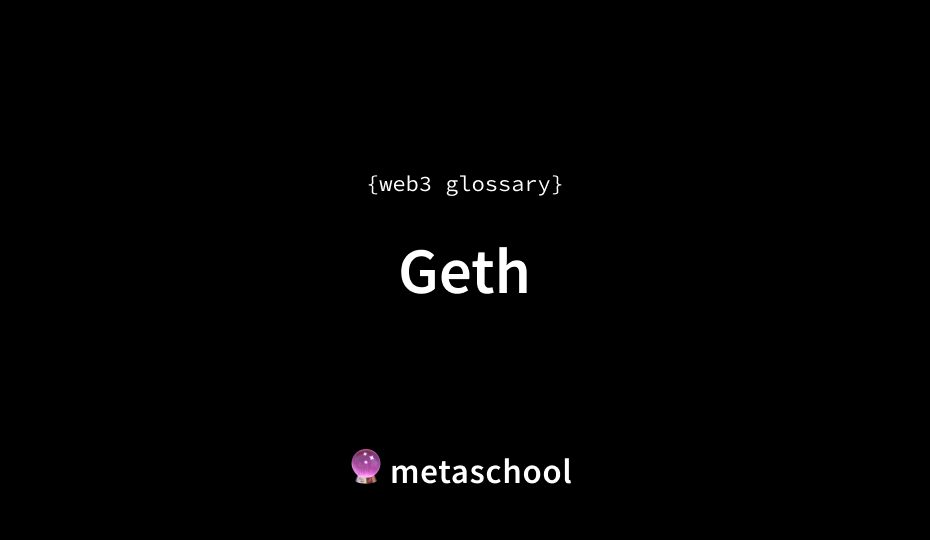Table of Contents
What is the meaning of Geth?
Geth – short for Go Ethereum – is a software program written in Go programming language developed by Google. Go is used to interact with Ethereum. It can also be referred to as an Ethereum client used to interact with the network.
It serves as a roadmap for entering the decentralized realm. It is basically a gateway used for sending and receiving Ether and interacting with dApps and smart contracts. It enables users to create accounts, mine Ether, and verify transactions on the network.
Origin of Go Ethereum
Geth’s roots are deeply embedded in the blockchain landscape. Developed in 2014 by Jefferey Wilcke, a pioneer in blockchain technology, it was designed as a fast and user-friendly implementation for accessing the Ethereum network.
Recognizing the diverse backgrounds of Ethereum users, from complete beginners to seasoned developers, Go Ethereum was created to facilitate seamless integration into the decentralized ecosystem.

The goal was to provide an intuitive interface that would empower users to engage with Ethereum’s capabilities without a steep learning curve. Since its inception, Geth has grown significantly in popularity and has established itself as one of the most widely used Ethereum clients, continually supporting the expanding community and the evolving needs of the blockchain world.
How to use Geth?
It is important to keep in mind these prerequisites before starting to work with Go Ethereum. You should have:
- Basic knowledge of working with Command Line.
- Basic knowledge about Ethereum and Testnets.
- Basic knowledge about HTTP and JavaScript.
- Basic knowledge of Node Architecture and Consensus Clients.
Now that you are familiar with what Geth is and the prerequisites, let’s explore how you can get started with Geth:
- Download Geth for your operating system.
- Follow the installation instructions according to your operating system.
- Sync Geth with the Ethereum blockchain. This may take some time.
- Create an account. This account will primarily be used to receive and send Ether (the official coin of Ethereum) which will further help you interact with dApps and Smart Contracts.
- Once you have made an account, you can also become a part of the mining process by using Geth to become a node that can verify and validate transactions.
Features of Go Ethereum
Some of the key features of Geth are as follows:
1. Geth client:
It is a software client for the Ethereum network that allows users to interact with the network in a user-friendly manner.
2. Interface:
Geth has a distinctive interface known as the Command-Line Interface (CLI) which includes multiple commands that can be used to interact with the network.
3. Consensus mechanism:
Geth supports both popular consensus mechanisms – Proof of Work (PoW) and Proof of Stake (PoS)
4. Geth wallet:
Earlier we talked about how the Geth account, when synchronized with the network, can also be used to trade Ether. To store Ether and other Ethereum-based tokens, Geth has an in-built Ethereum wallet.
5. JSON-RPC and web3.js API
Geth provides a JSON-RPC API that allows developers to interact with the Ethereum network using various programming languages. It also supports the web3.js library, which is a popular JavaScript library for interacting with the Ethereum network.
Alternative Ethereum Implementations
There are multiple (active) Ethereum implementations that are similar to Geth, including:
- Nethermind: A high-performance Ethereum client focused on optimizing for enterprise use cases. It supports various consensus algorithms and provides robust APIs for developers.
- Besu: An Ethereum client written in Java, primarily aimed at enterprise solutions. Besu supports both public and private networks and features a rich set of tools for developers.
- EthereumJS: A collection of JavaScript libraries that allow developers to build Ethereum applications. It’s lightweight and flexible, making it ideal for frontend integration and dApp development.
Some limitations of Go-ethereum:
While there is a number of advantages of Geth, there are some limitations as well and they are:
1. Lack of interoperability:
Geth is not much of an interoperable feature. It is ideally suited for the Ethereum blockchain and using it for some other blockchain network may hamper user experience on the whole
2. Resource-intensive:
Running a Geth node can be resource-intensive, especially while integrating the node to the network. This may take time, and demand power storage and memory.
3. Security:
Security may be an issue because Geth relies on users’ private keys. In the wake of an exogenous shock such as a hacker attack, the security could be compromised.
In conclusion, Geth is a solid client that can come in handy for those interested in knowing the Ethereum blockchain at a deeper level. Developed on the Go programming language, it is one of the widely used Ethereum implementations.
FAQs
What are the primary uses of Geth for Ethereum users?
Geth serves as a comprehensive Ethereum client that allows users to interact with the Ethereum blockchain. With Geth, you can create accounts to send and receive Ether, participate in the mining process, and interact with decentralized applications (dApps) and smart contracts.
How does Geth differ from other Ethereum implementations?
While Geth is one of the most widely used Ethereum clients, we have briefly discussed other implementations as well. The main differences lie in performance, resource requirements, and specific features. For instance, Geth is known for its user-friendly command-line interface, while others may offer more advanced functionality or better interoperability with other blockchains. Each implementation has its strengths, making them suitable for different user needs.
What are the security considerations when using Geth?
Security is a crucial aspect when using Geth, as it relies on private keys to manage accounts. Users must ensure their private keys are stored securely to avoid potential hacks or loss of funds. Additionally, running a Geth node can be resource-intensive, which may introduce vulnerabilities if not managed properly. It’s essential to follow best practices for securing your system and protecting your Ethereum assets
